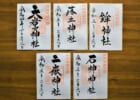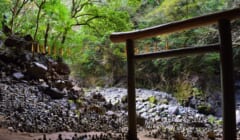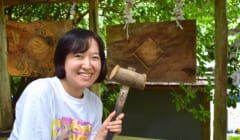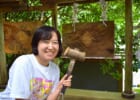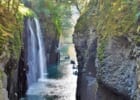
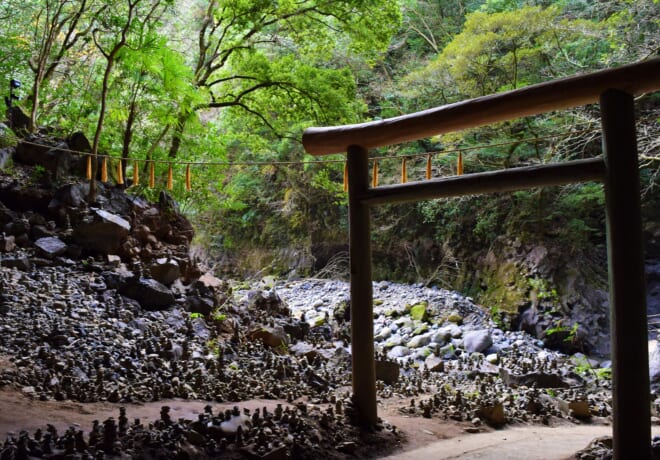
Visit the ultimate power spots of Takachiho! A complete Ama-no-Iwato walking guide
- 0 お気に入り
- 5532 view
- お気に入り登録

The Ama-no-Iwato myth, recorded in the Kojiki (Records of Ancient Matters) and Nihon Shoki (The Chronicles of Japan) tells the story of the world of the gods. To get a real-life glimpse into the various legends that surround this myth, head to the Ama-no-Iwato Shrine in Takachiho.
In the past, the West Main Shrine had been called the Ama-no-Iwato Shrine, and the East Main Shrine had been the Uji Shrine/Ama-no-Iwato Grand Shrine. In 1970, these two shrines were combined to form the current Ama-no-Iwato Shrine.
This time around, we will be introducing you to the recommended walking courses for visiting the Ama-no-Iwato Shrine and its various power spots.
What is the Ama-no-Iwato myth?
Amaterasu-Omikami, the goddess of the sun, angered by her younger brother Susanoo-no-Mikoto’s violence at Takamagahara, hid herself in the Ama-no-Iwato Cave, plunging the world into darkness. Amaterasu-Omikami was eventually drawn out of the cave through the ingenuity of the various gods, and Susanoo-no-Mikoto was banished.
(Source: 旺文社日本史事典 三訂版, “Obunsha Japanese History Encyclopedia [Third Edition]”)
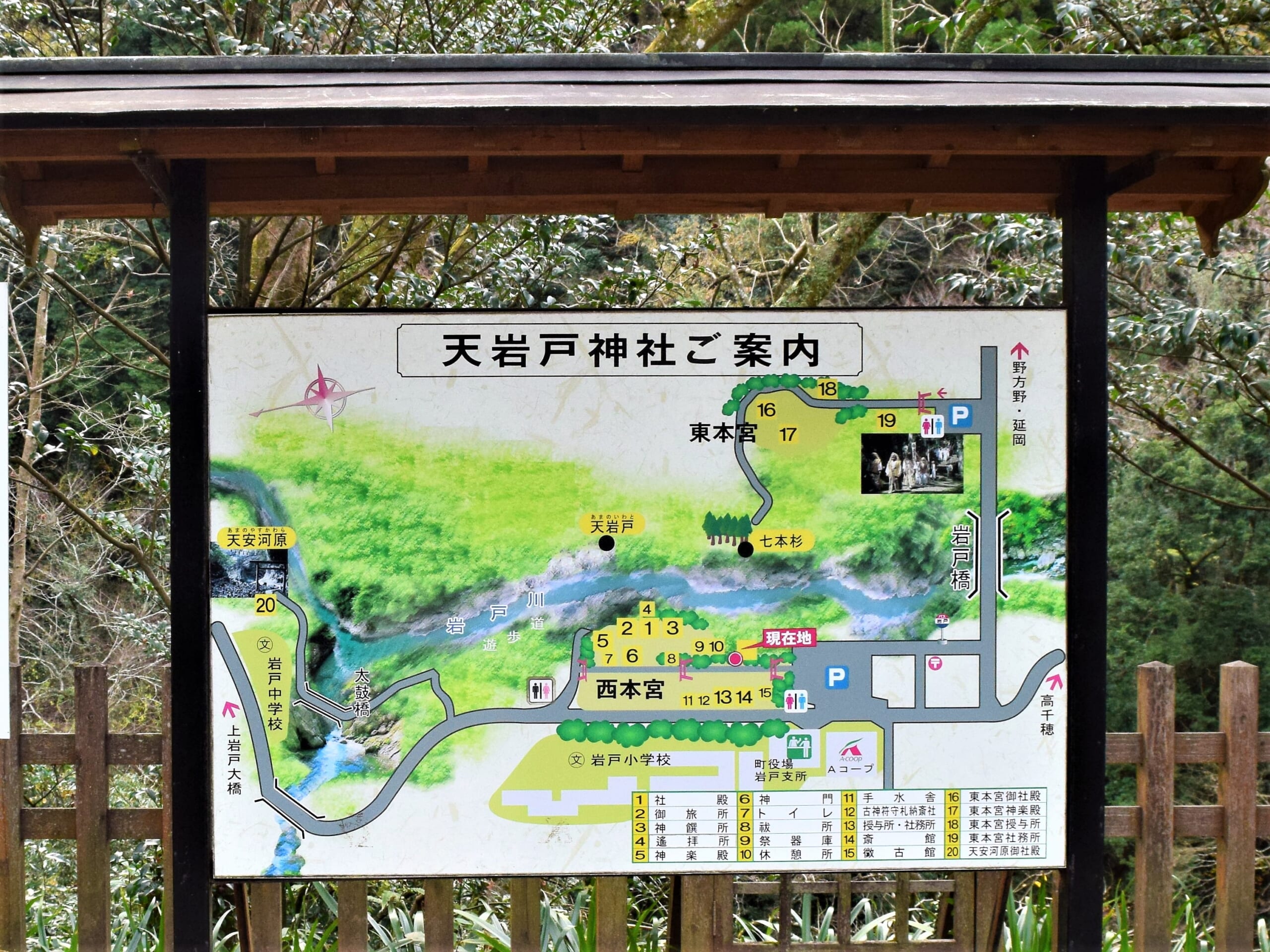
Enter “Ama-no-Iwato Shrine” in your car’s GPS system, and you will see two locations: “Amanoiwato Shrine” – the West Main Shrine and “Amanoiwato Shrine Higashihongu” – the East Main Shrine. Start by heading to the West Main Shrine.
From there, you will be able to walk to the East Main Shrine and Ama-no-Yasukawara in just an hour or two.
West Main Shrine, which is dedicated to Ama-no-Iwato Cave
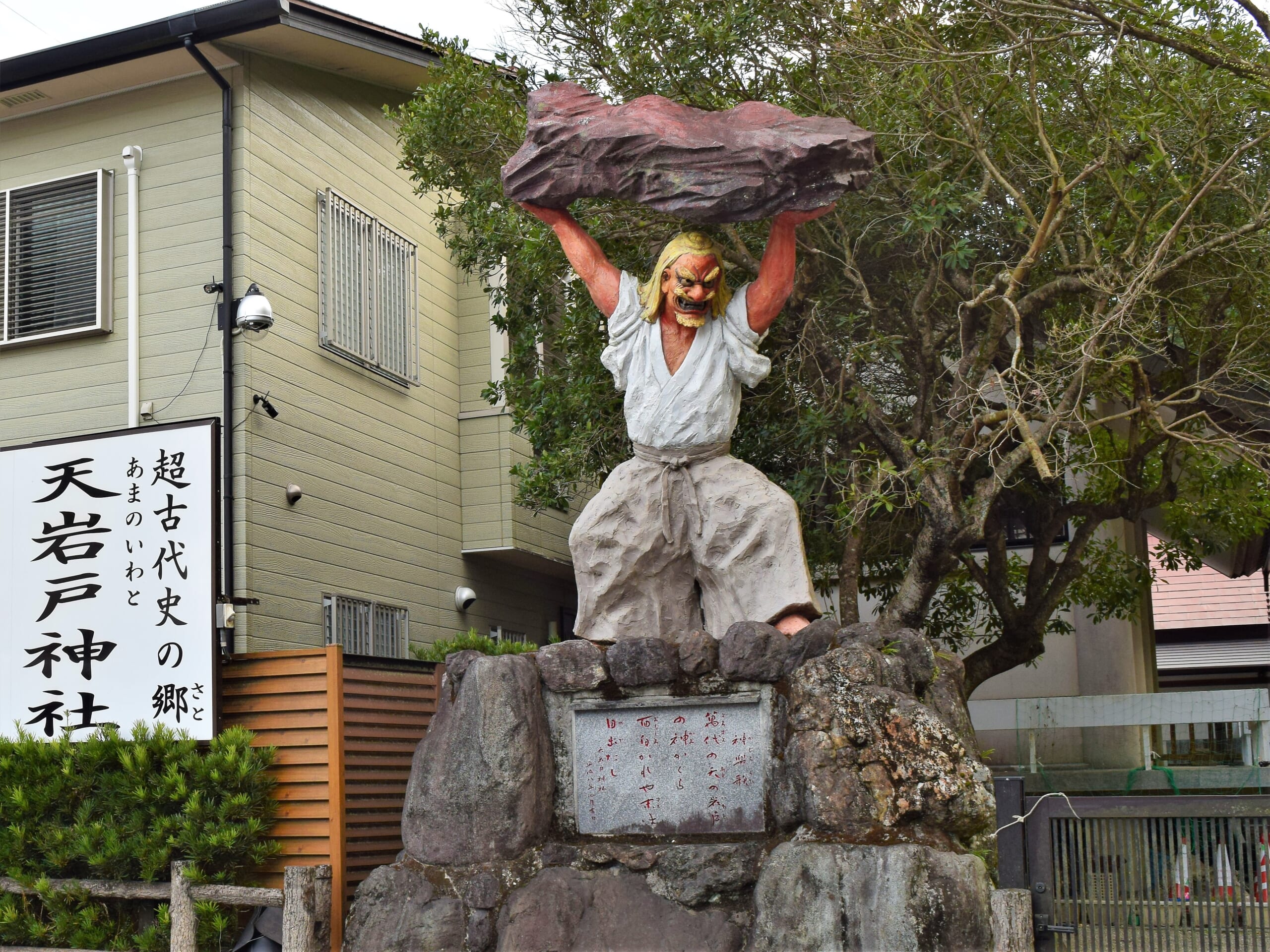
At the parking lot of the West Main Shrine, you will be greeted by a large statue of Ame-no-Tajikarao.
Ame-no-Tajikarao is a physically powerful god who pulled Amaterasu-Omikami out of Ama-no-Iwato Cave when she peeked out to have a look. The rock at the cave entrance, which Ame-no-Tajikarao threw far away—in order to prevent Amaterasu-Omikami from hiding in the cave again—is said to have become Mt. Togakushi in Nagano Prefecture.
Ame-no-Tajikarao, the most physically powerful among the god, is said to offer blessings in sports and improvements to one’s skills and craft.
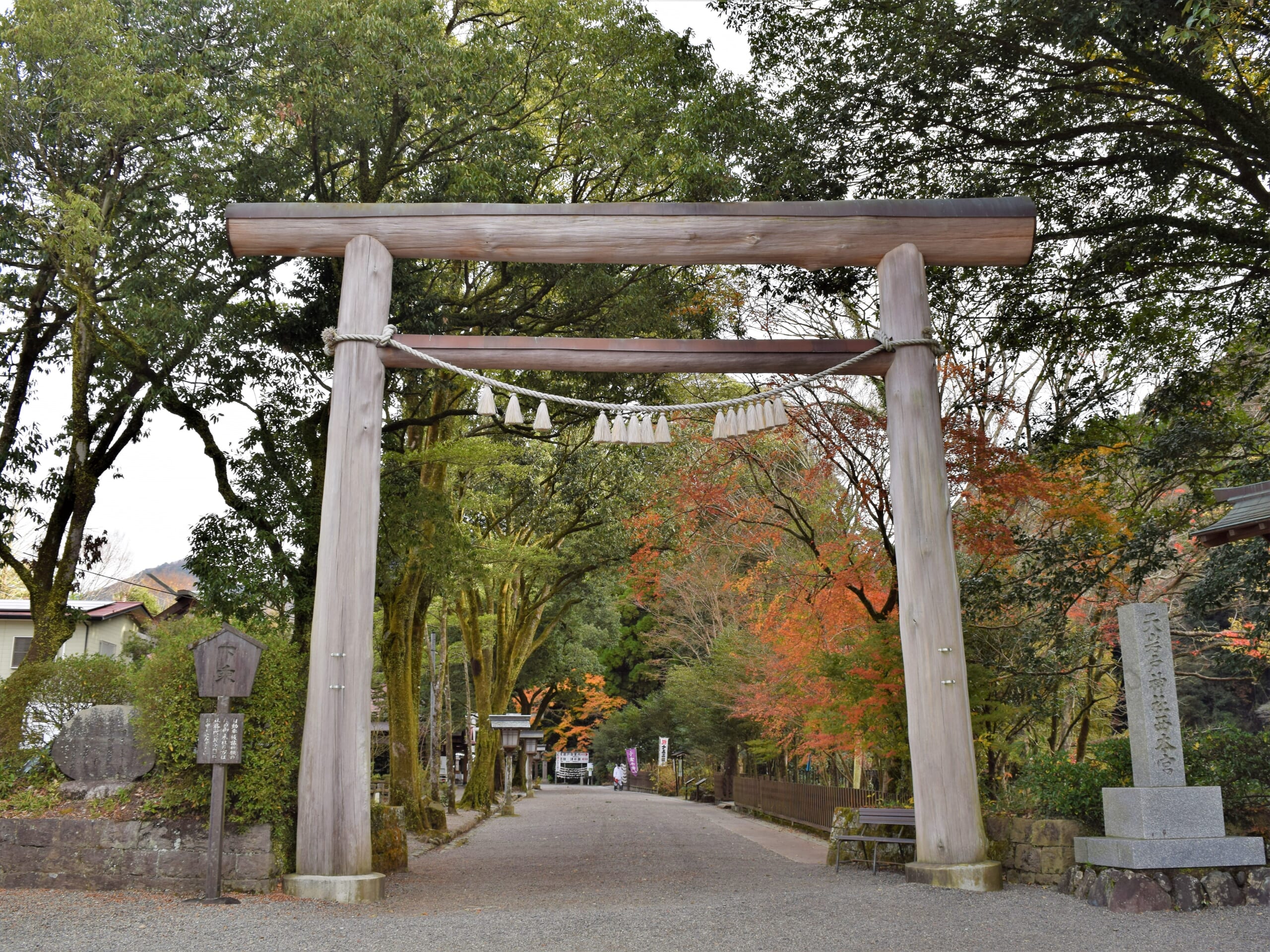
First, bow in front of the torii gate and say “Ojama itashimasu”, as a “Thank you for having me”. Then proceed on the path leading up to the shrine.
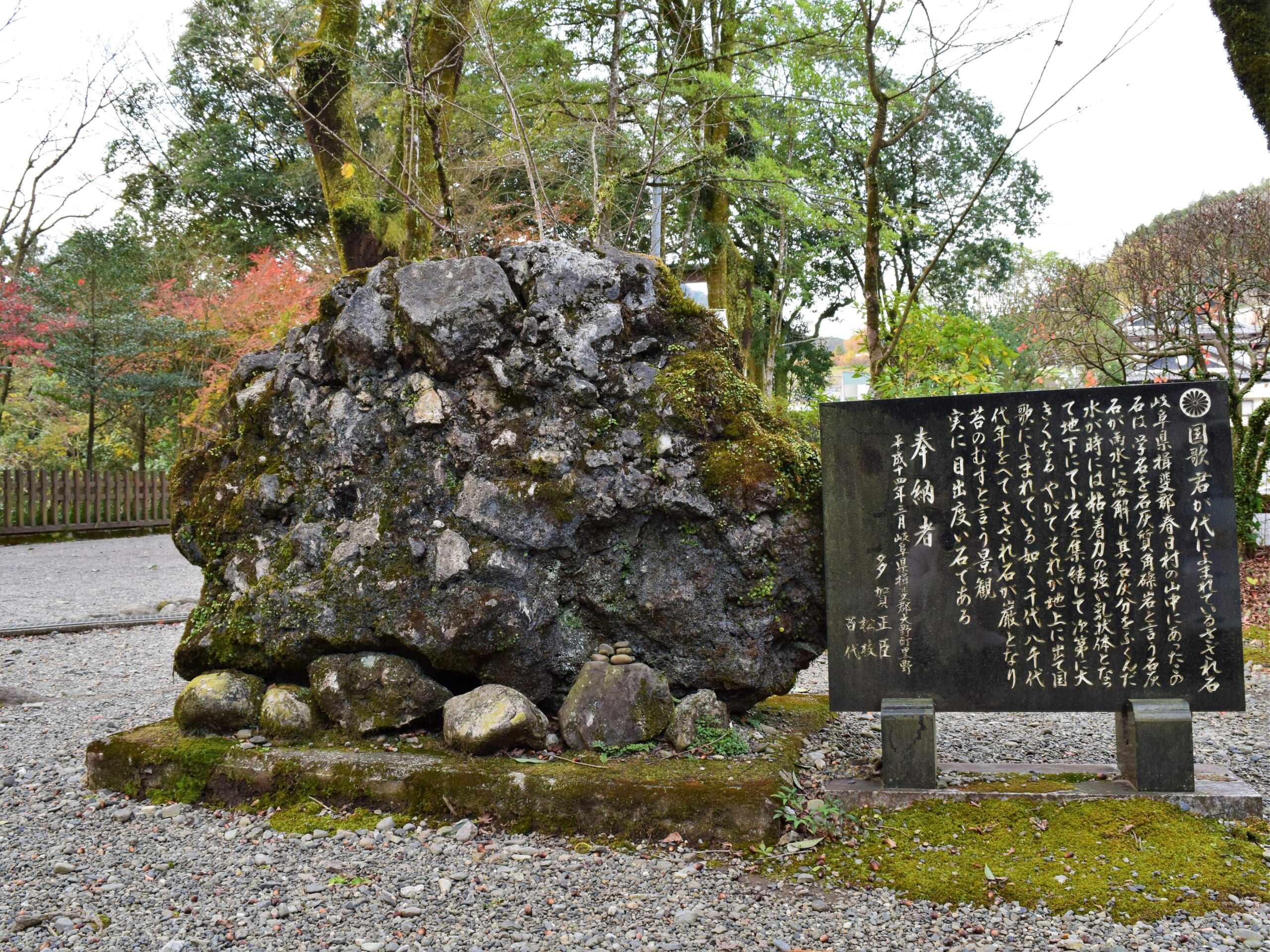
Follow the path and behind the statue of Ame-no-Tajikarao, you will find a sazare-ishi – a boulder formed from gravel and sediment.
Sazare-ishi, which are included in the lyrics for the Japanese national anthem “Kimigayo,” is said to be an auspicious type of stone. While the sazare-ishi doesn’t have much to do with mythology, this is a power spot, and we recommend you stop by.
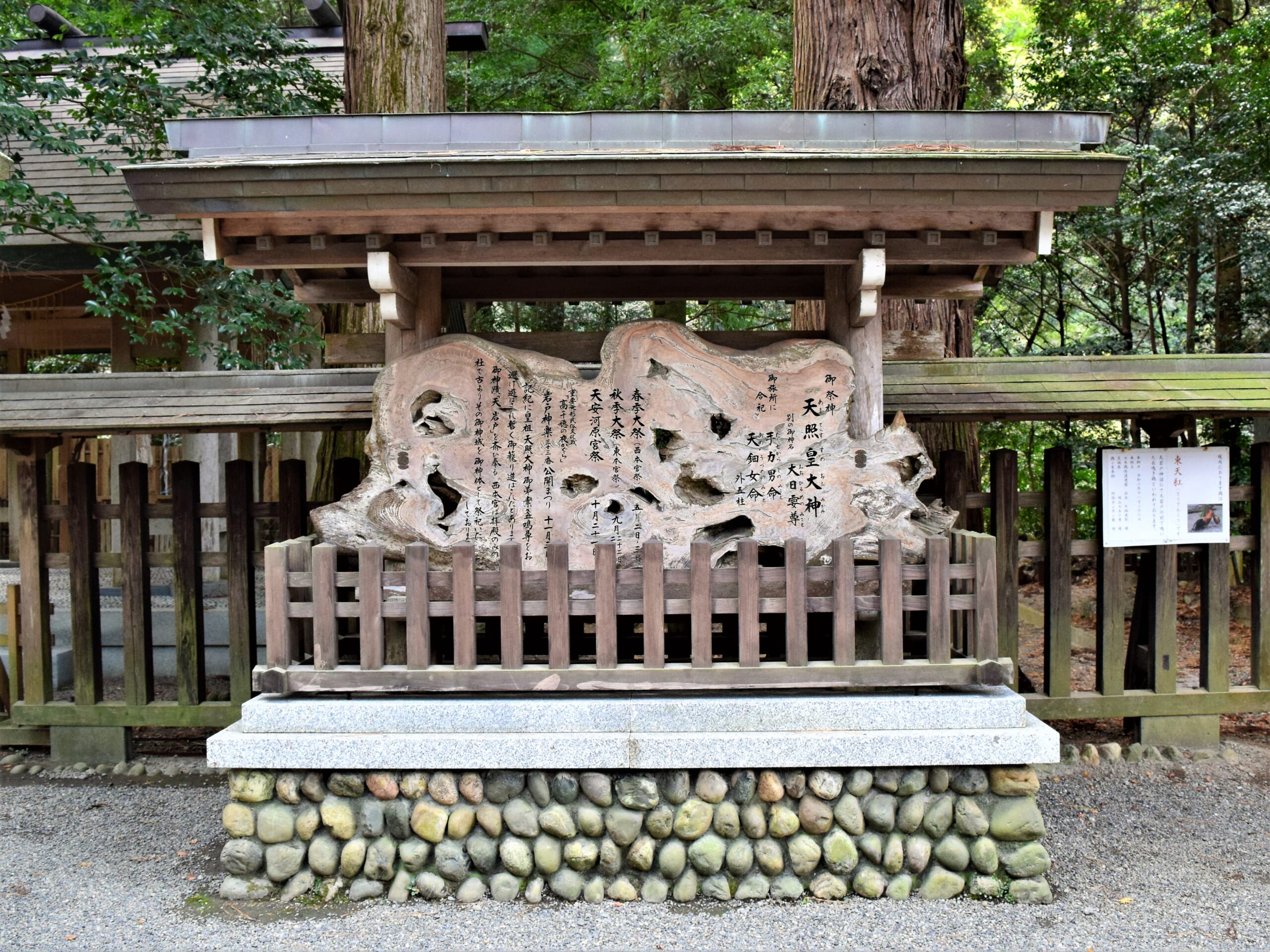
The West Main Shrine has only a Worship Hall, with a sign saying that it enshrines the shrine area itself.
In other words, Ama-no-Iwato Cave, the hiding place of Amaterasu-Omikami, is the object of worship at the shrine.

Purify yourself with the sacred water, then head to the shrine to pray. Pass quietly through the shrine gates, then bow twice, clap twice, and bow one more time in front of the Worship Hall.
Praying at the shrine is said to fulfillment of various wishes. Join your hands together for a prayer and express gratitude for your everyday life.
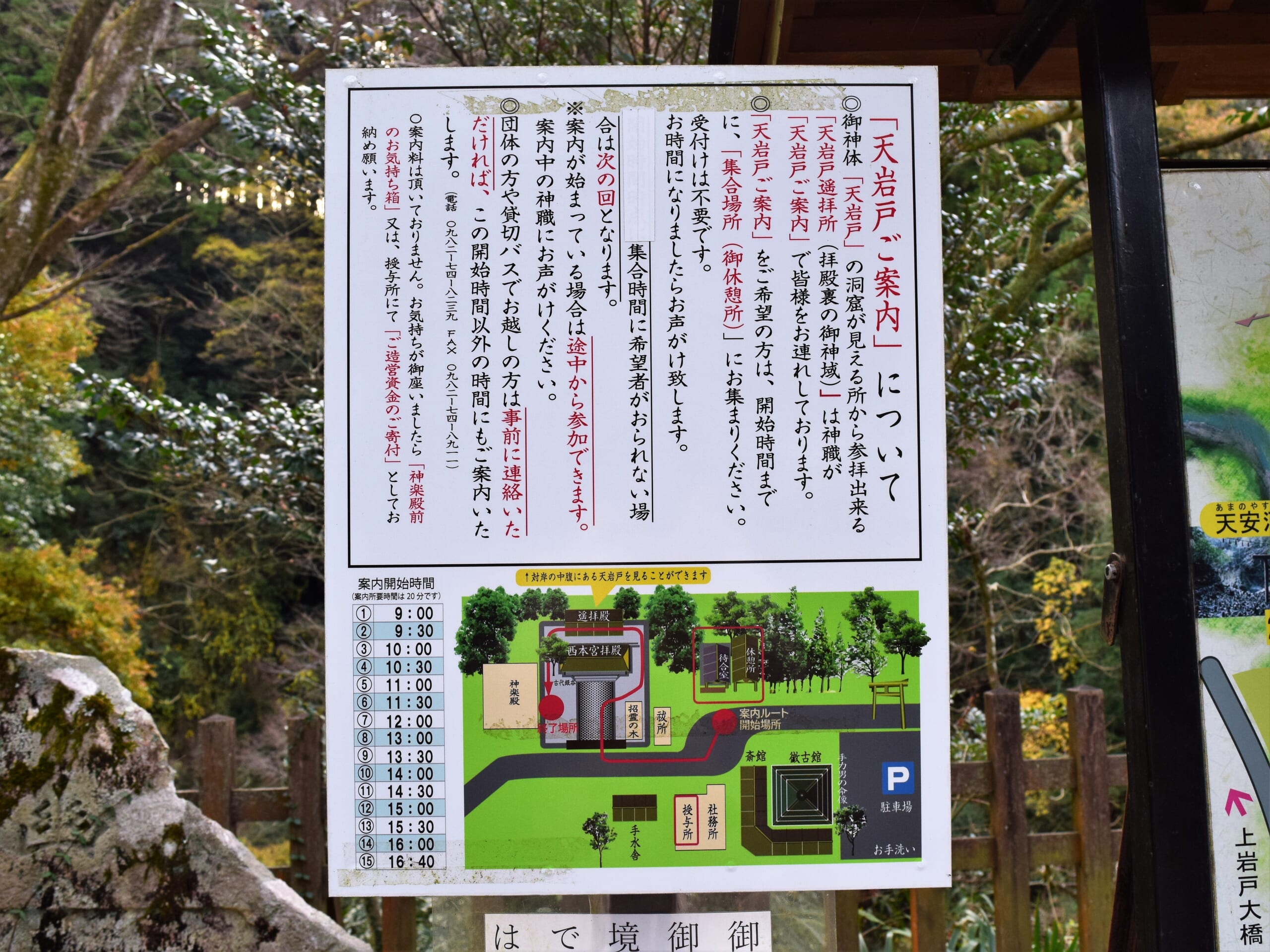
The object of worship, Ama-no-Iwato Cave, is located at the back of the Worship Hall. Normally it is not available to be seen by the public, but it can be viewed under the guidance of a Shinto priest. These guided tours take place 15 times a day, from 9:00 A.M. to 4:40 P.M. We encourage you to participate if you have the time.

The Yohaiden, the worship hall if front of where Ama-no-Iwato Cave is located, is within the shrine area. Get purified by the priest and then head inside.
Ama-no-Iwato Cave, in a word, is incredible! During the tour you are able to pray in front of the object of worship while listening to the explanations provided in Japanese by the Shinto priest. As photography is not permitted in this area, we are unable to provide any photos. Instead, we highly recommend you see and experience the energy of this incredible power spot with your own eyes.

The Ogatama-no-Ki (Magnolia compressa), located on the grounds of the West Main Shrine, is another of the shrine’s power spots.
“Ogatama” means “to invite the gods,” and indeed, the Ogatama-no-Ki is said to bring romantic fulfillment and happiness into one’s life.
East Main Shrine, which was home to Amaterasu-Omikami
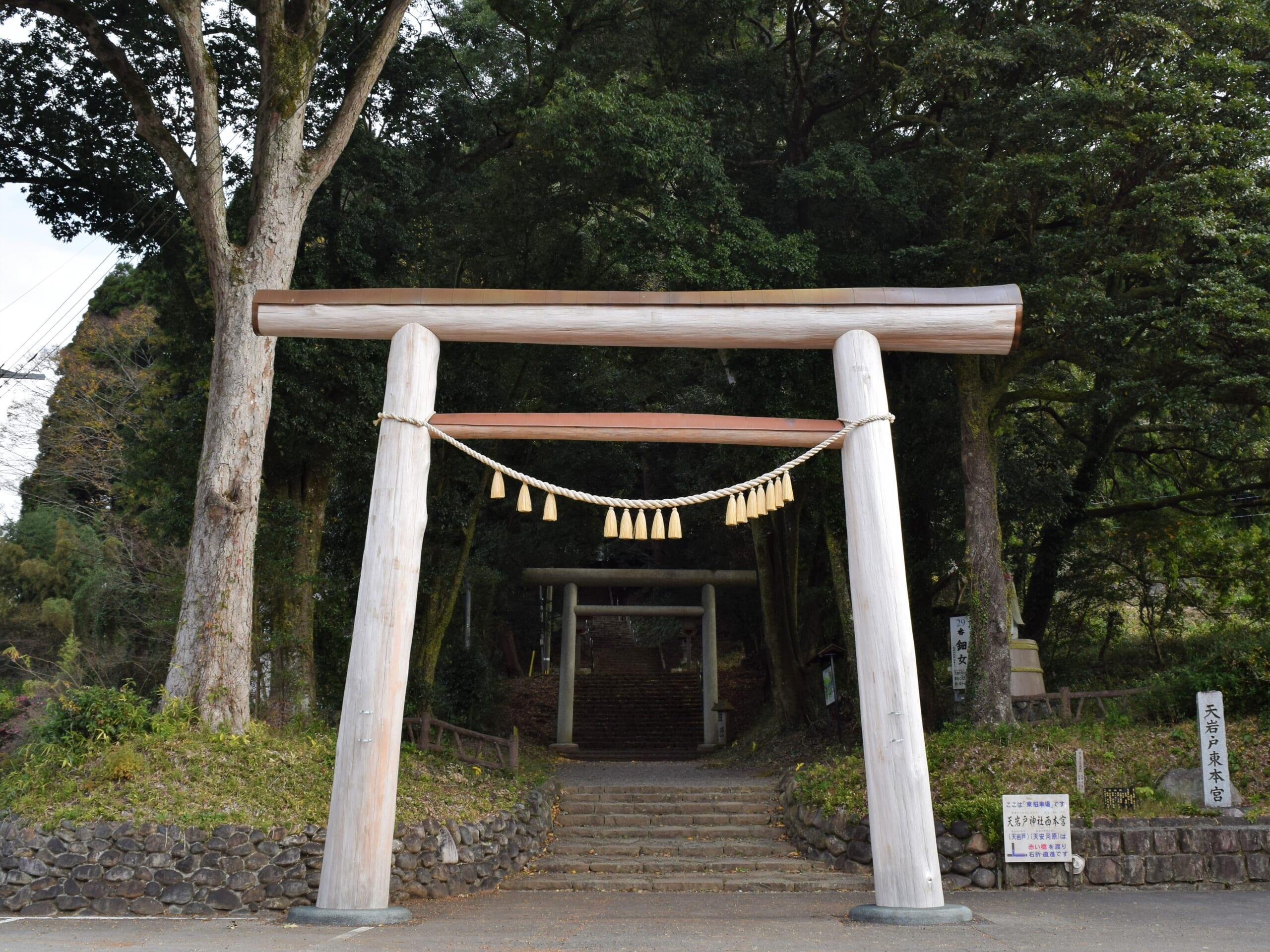
After leaving the grounds of the West Main Shrine, walk back the way you came, then walk an additional 10 minutes. Your next stop will be the East Main Shrine.
Unlike the well-maintained West Main Shrine, the East Main Shrine is located in a quiet place, all around surrounded by trees.
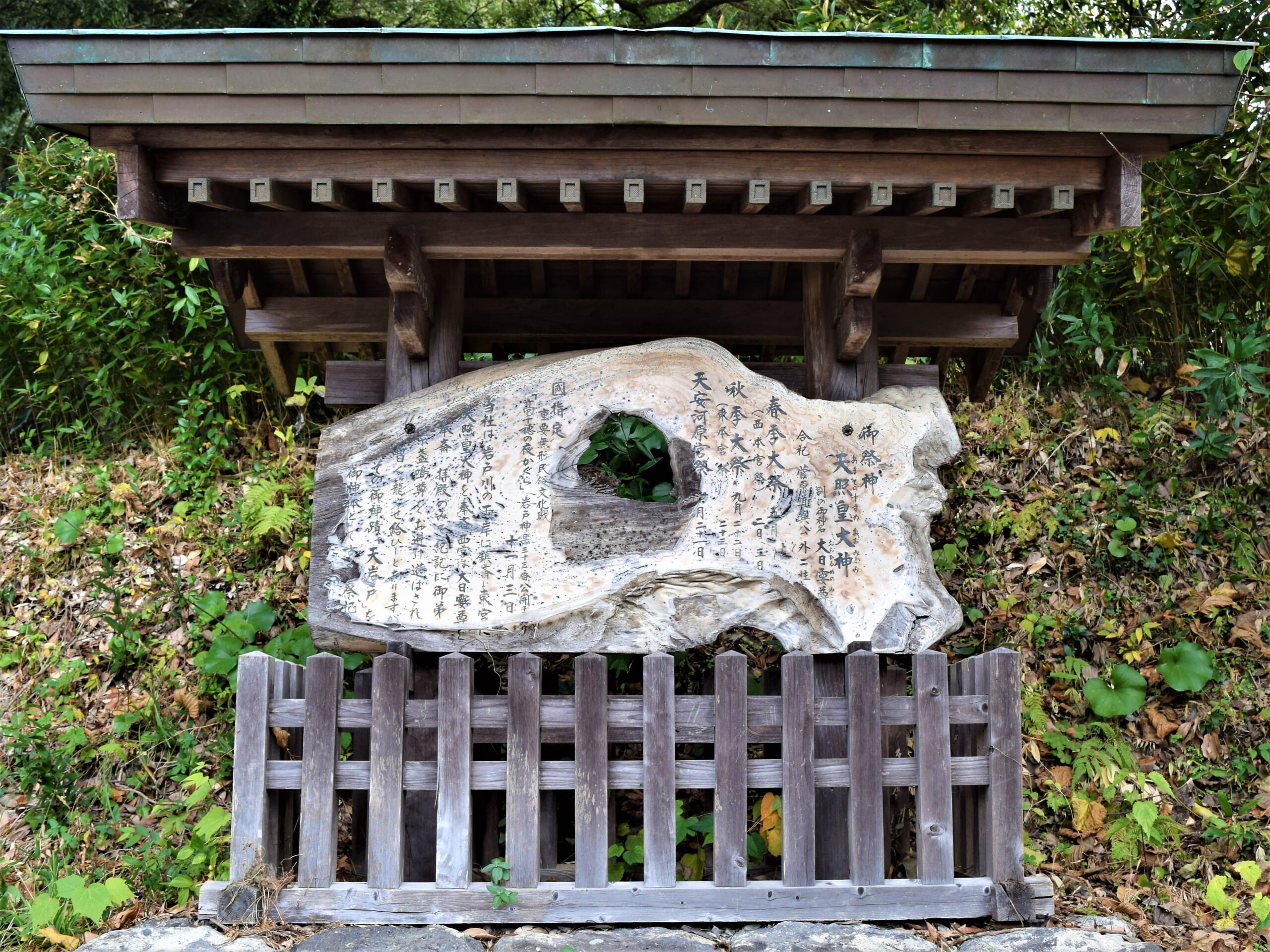
The East Main Shrine was where Amaterasu-Omikami first lived after emerging from the Ama-no-Iwato Cave.
The West Main Shrine enshrines Ohirume-no-Mikoto, while the East Main Shrine enshrines Amaterasu-Omikami. These are actually the same god, referred to by different names.

Pass through the torii gate and you will come across a statue of Ama-no-Uzume – the goddess of entertainment, slowly rotating on its base.
Ama-no-Uzume-no-Mikoto performed a dance while holding a branch from the Ogatama-no-Ki, drawing laughter from all of the ancient gods, in order to draw the attention of Amaterasu-Omikami, who had hidden herself away in Ama-no-Iwato Cave.
This goddess was cheerful and innocent, capable of turning her moment-to-moment thoughts into action. As such, her blessings are said to be in performing arts, fine art, and bugaku (traditional Japanese court dance/music).
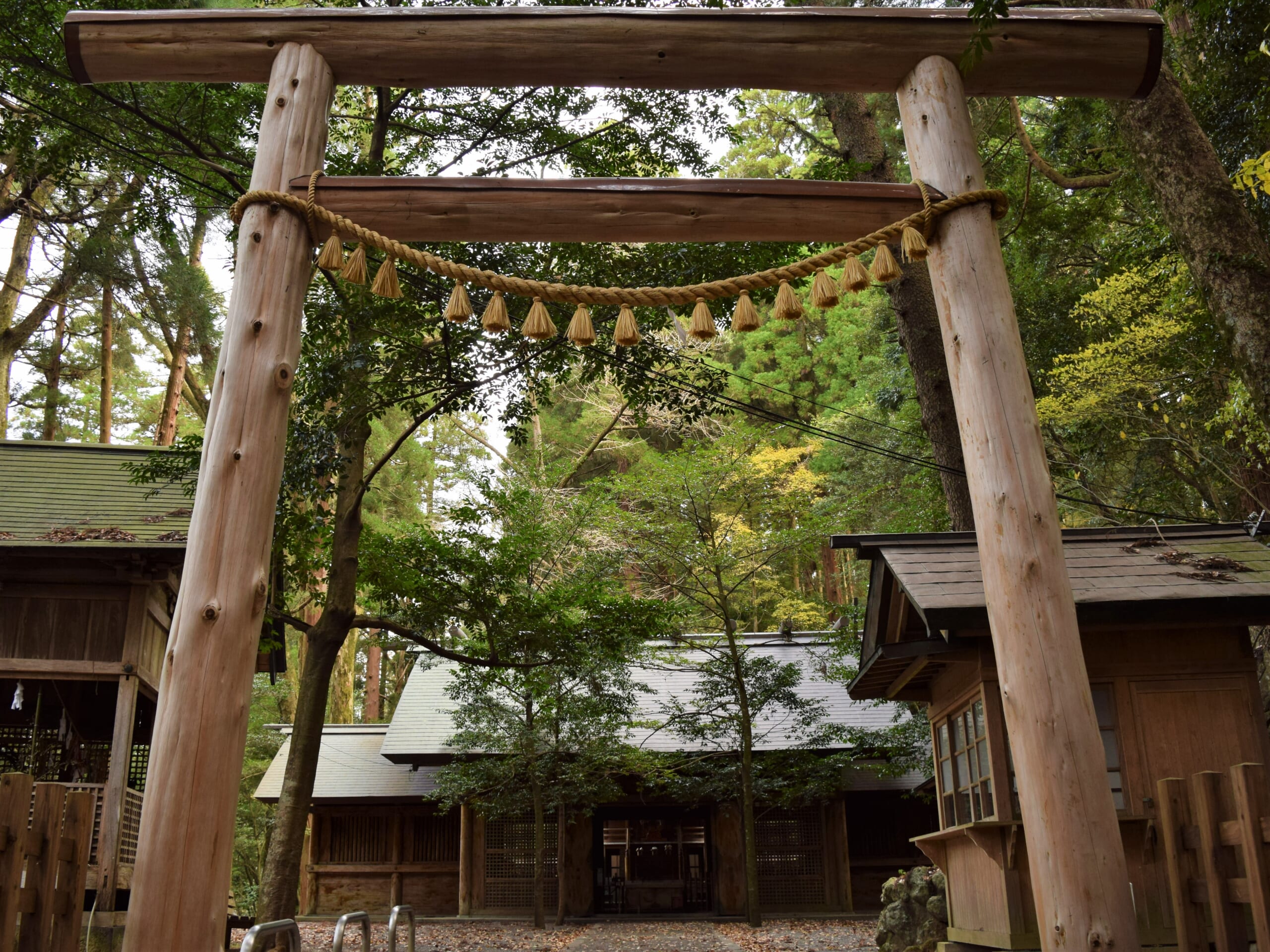
Just past the stone steps surrounded by the trees, is the Inner Shrine of the East Main Shrine. The secluded shrine building and the quiet, dignified atmosphere will make you feel inspired, invigorated even. The blessing of the East Main Shrine is, like the West Main Shrine, the fulfillment of various wishes.
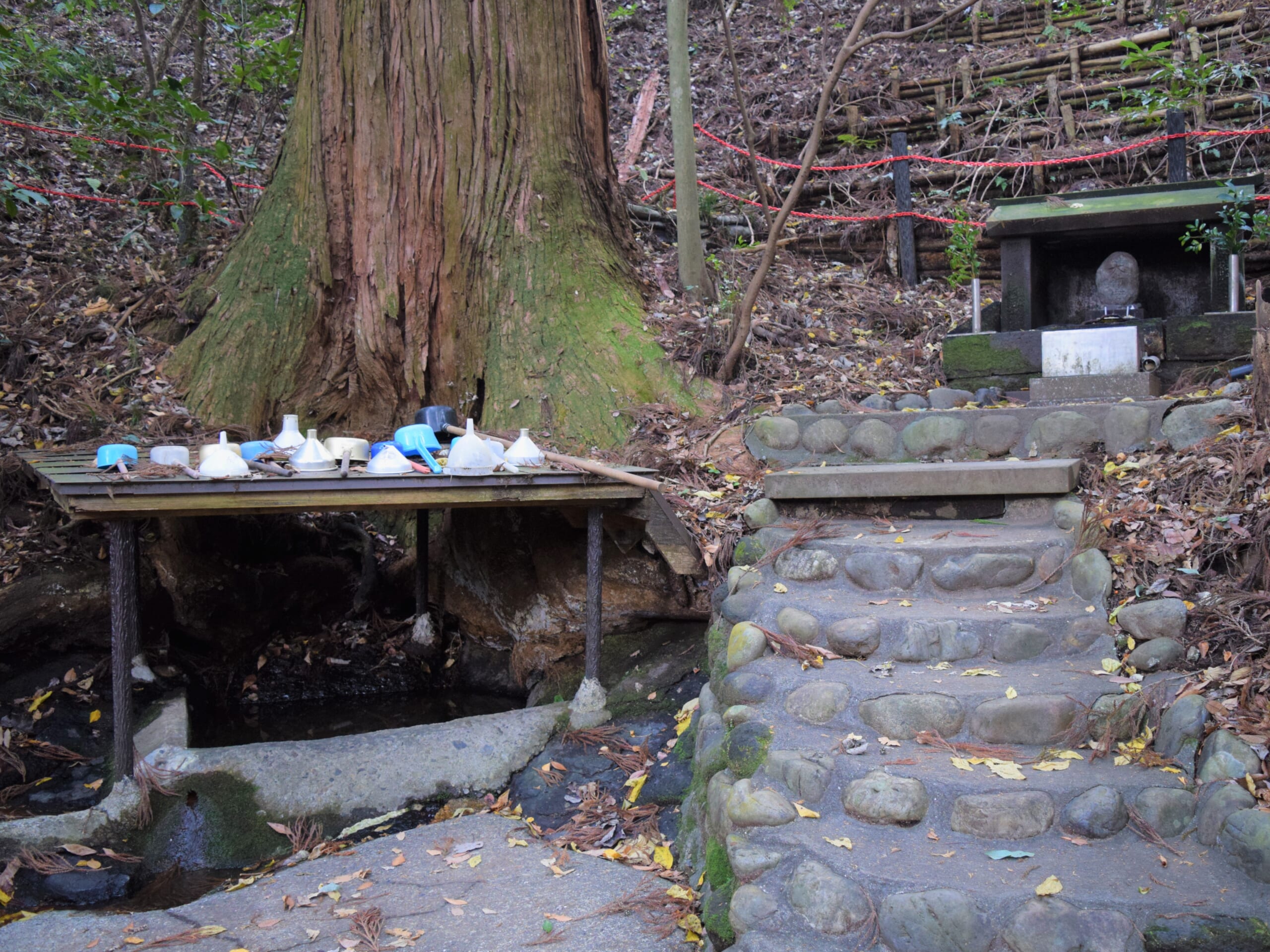
Behind the Inner Shrine of the East Main Shrine is a spring that bubbles forth from the roots of a sacred cedar tree.This is another hidden power spot. It is said that drinking this water purifies the body and gives you power.
Nearby is a small shrine that enshrines a boulder with the word “Daijingu (Grand Shrine)” carved into it.
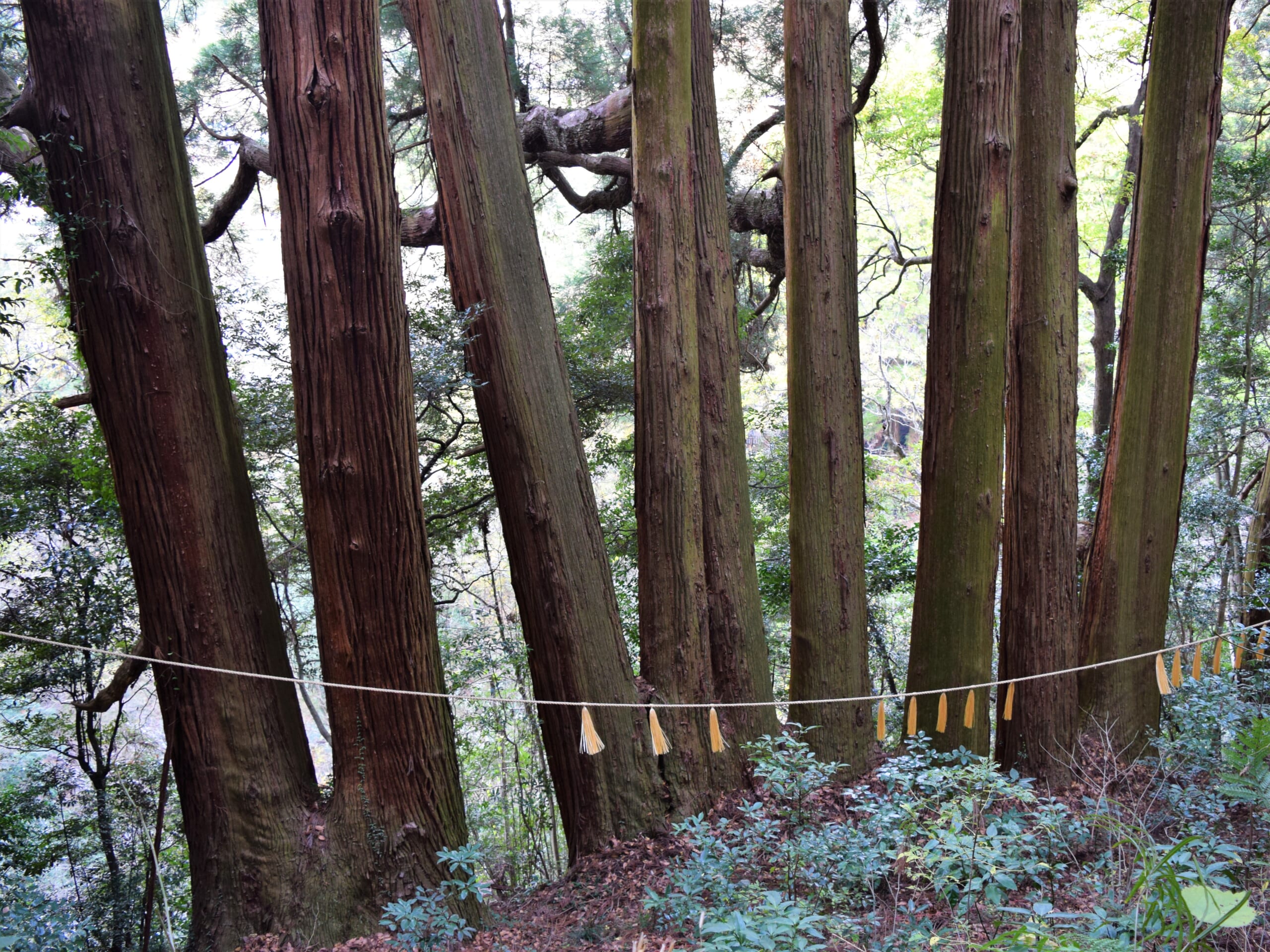
Walk further away from the sacred spring, and you will find yourself in front of the Nanahonsugi (the Seven Cedars). The 7 cedar trees are with connected with their roots intertwined, extending to the very edge of a cliff. This is another one of the shrines power spots.
If you look closely at the trees, it actually appears to be nine of them. However, according to the Ama-no-Iwato Shrine Office the seven trees on the right are part of the Nanahonsugi, with the two to the left counted separately.
Ama-no-Yasukawara, one of Japan’s most outstanding power spots

After leaving the East Main Shrine, go back the way you came, through the West Main Shrine and towards Ama-no-Yasukawara.
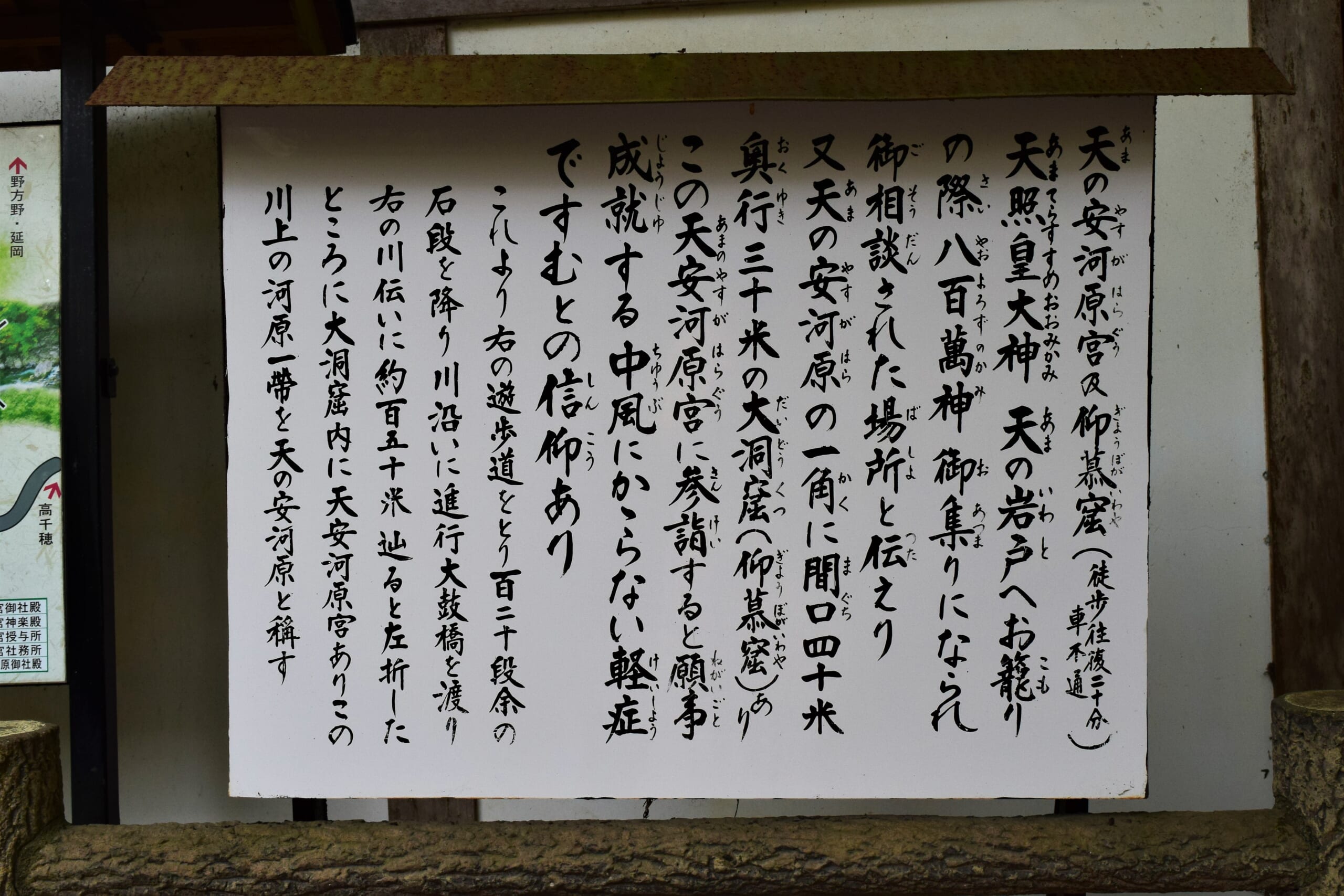
Near the torii gate on the road behind the West Main Shrine is a sign with an explanation of Ama-no-Yasukawara.
According to the sign, the entire riverbed area, including sites like the Gyoubogaya-Iwaya Cave and the Ama-no-Yasukawara Shrine, are referred to as the Ama-no-Yasukawara.

After following the road for a bit you will come across the entrance sign to Ama-no-Yasukawara, from here the path continues on a walkway. The negative ions feels great.

Midway to the Ama-no-Yasukawara, there is an arched bridge stretching over the Iwato river. This is actually the number one superior power spot!
It is said to be the barrier that separates the everyday world and the sacred realm. Try standing on the bridge and take in the energy.
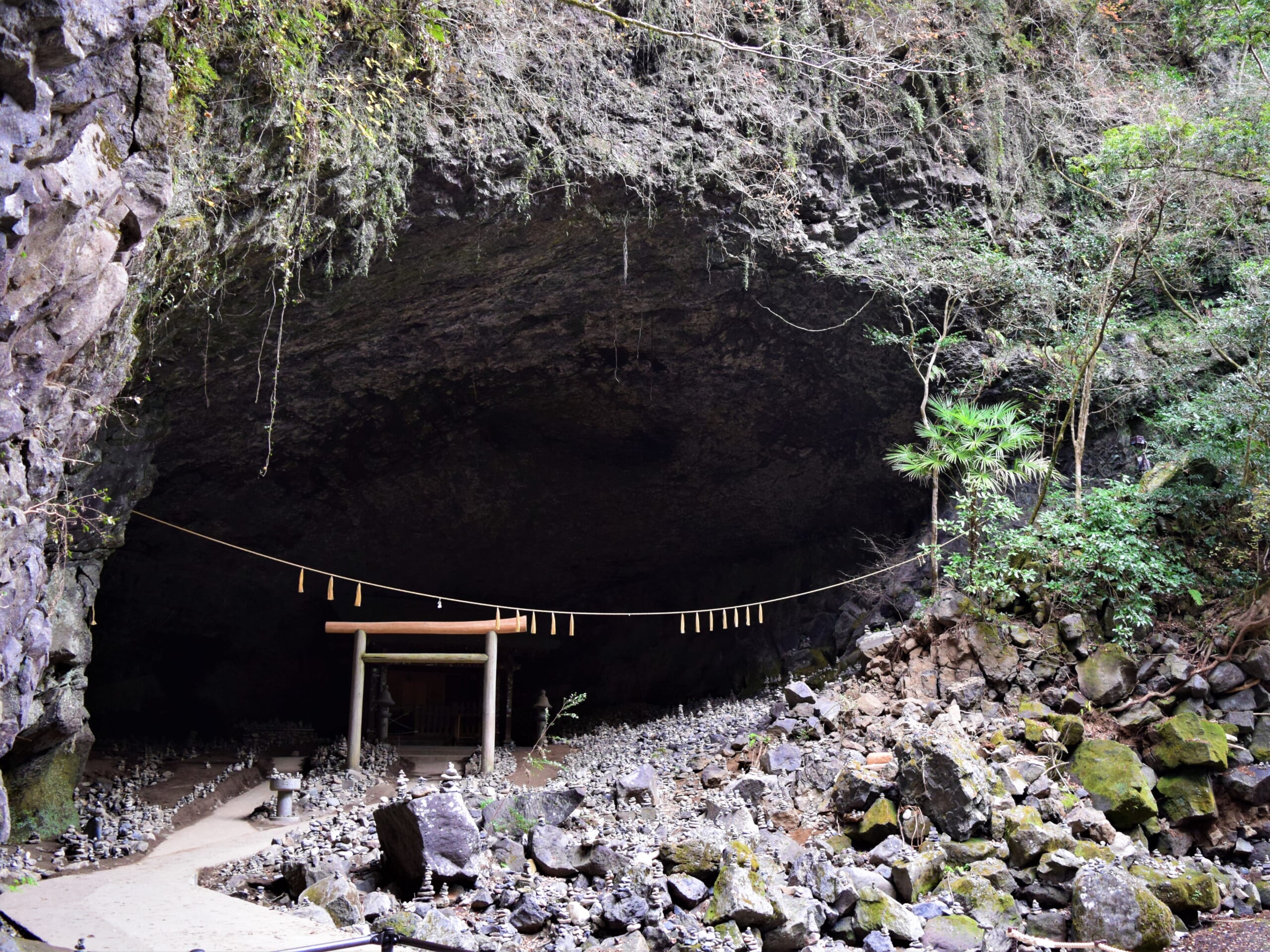
Once you arrive at Ama-no-Yasukawara, you will encounter an enormous cave, called the Gyoubogaya-Iwaya Cave, it is about 40 meters wide and 30 meters deep.
According to the Ama-no-Iwato myth, this is the cave where countless of ancient gods gathered for meetings day in and day out, in order to draw Amaterasu-Omikami out of hiding.
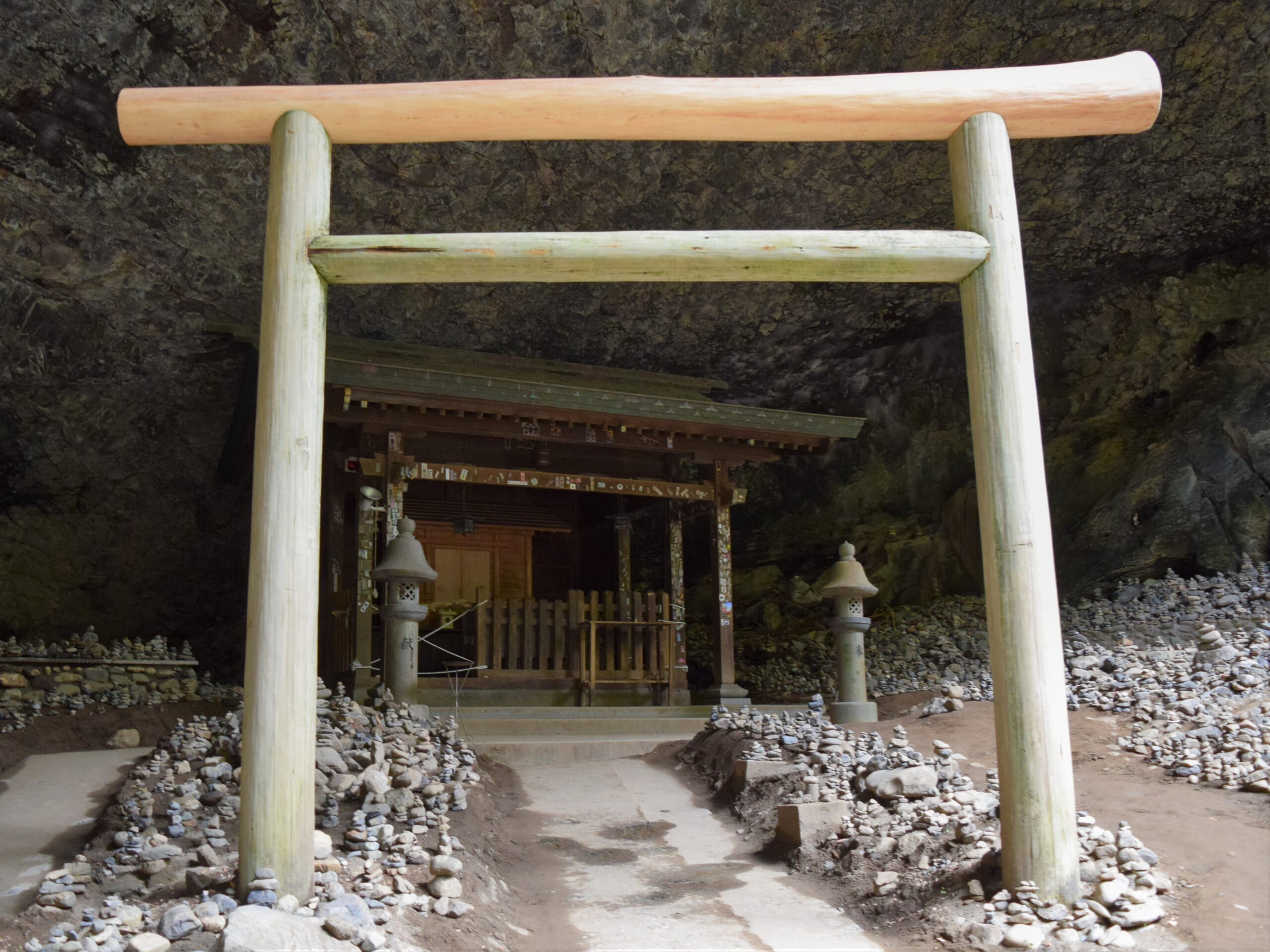
The Ama-no-Yasukawara Shrine is located within the Gyoubogaya-Iwaya Cave.
Enshrined here are Omoikane-no-Kami and Yaoyorozu-no-Kami.
“Yaoyorozu-no-Kami” actually refers to countless ancient gods. Which is why it makes sense that the blessing of this shrine is the fulfillment of many different wishes.
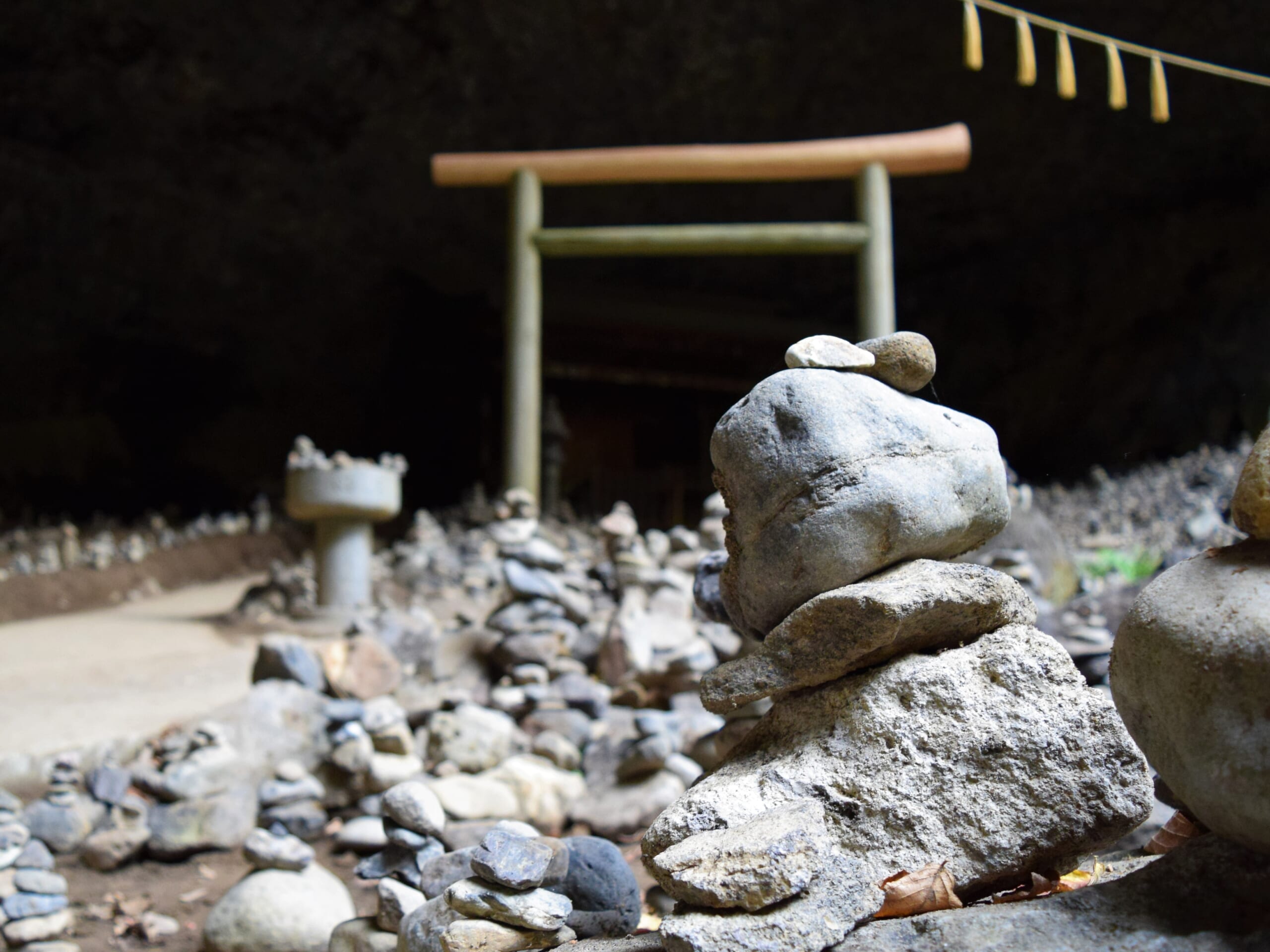
It is said that if you make a wish while stacking rocks at Ama-no-Yasukawara, your wish will come true.
The stacks of rocks, lined up one next to the other by those who have made various wishes, gives the place a fairytale-like feel.
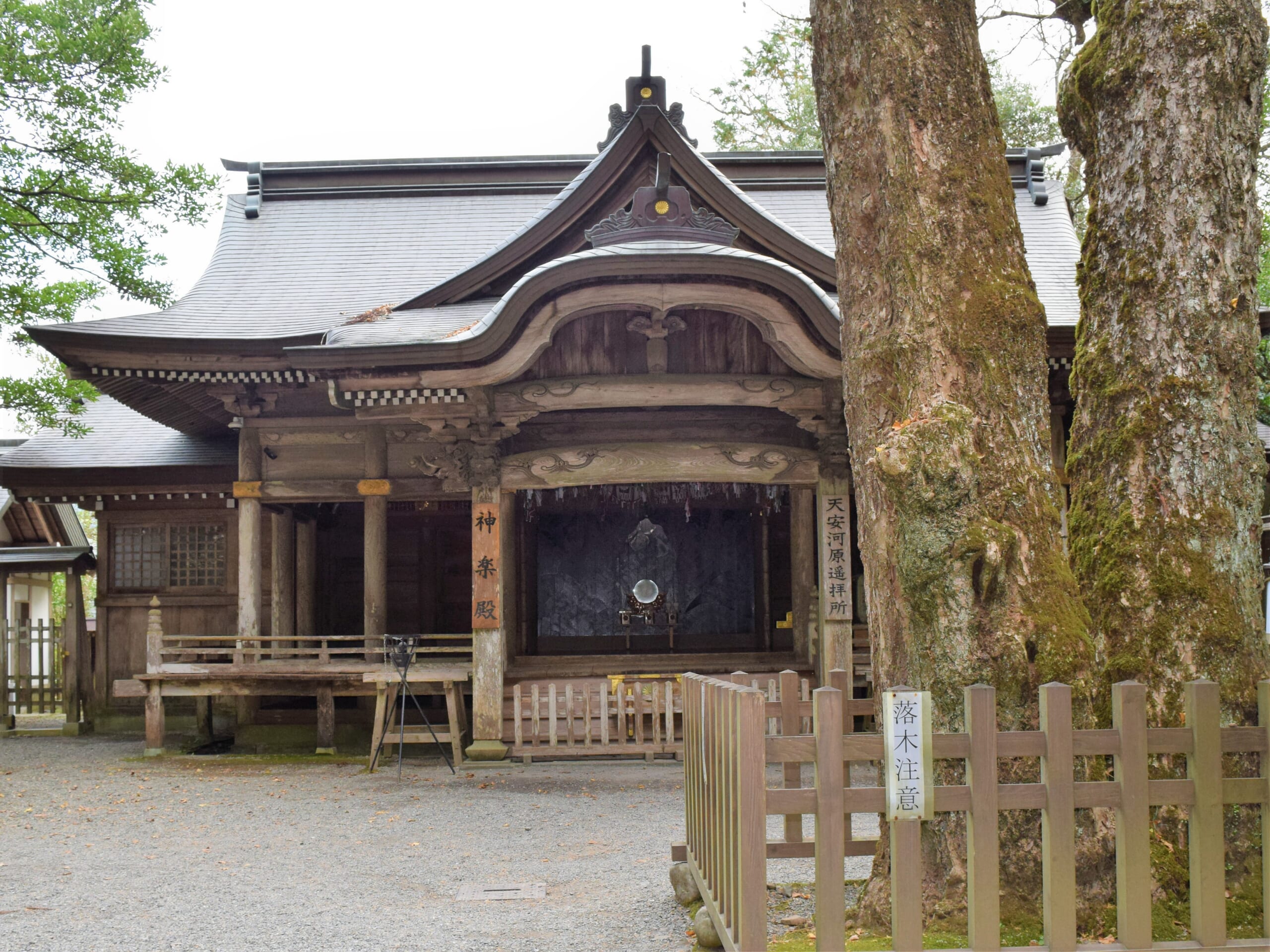
If you find it difficult to walk in sloping terrain, you can visit the Ama-no-Yasukawara Worship Site (天安河原宮遥拝所), located on the grounds of the West Main Shrine.
The worship site is built for visitors to worship the gods of distant shrines, meaning it may be worth heading here first.
Bathe in negative ions while resting or looking for souvenirs
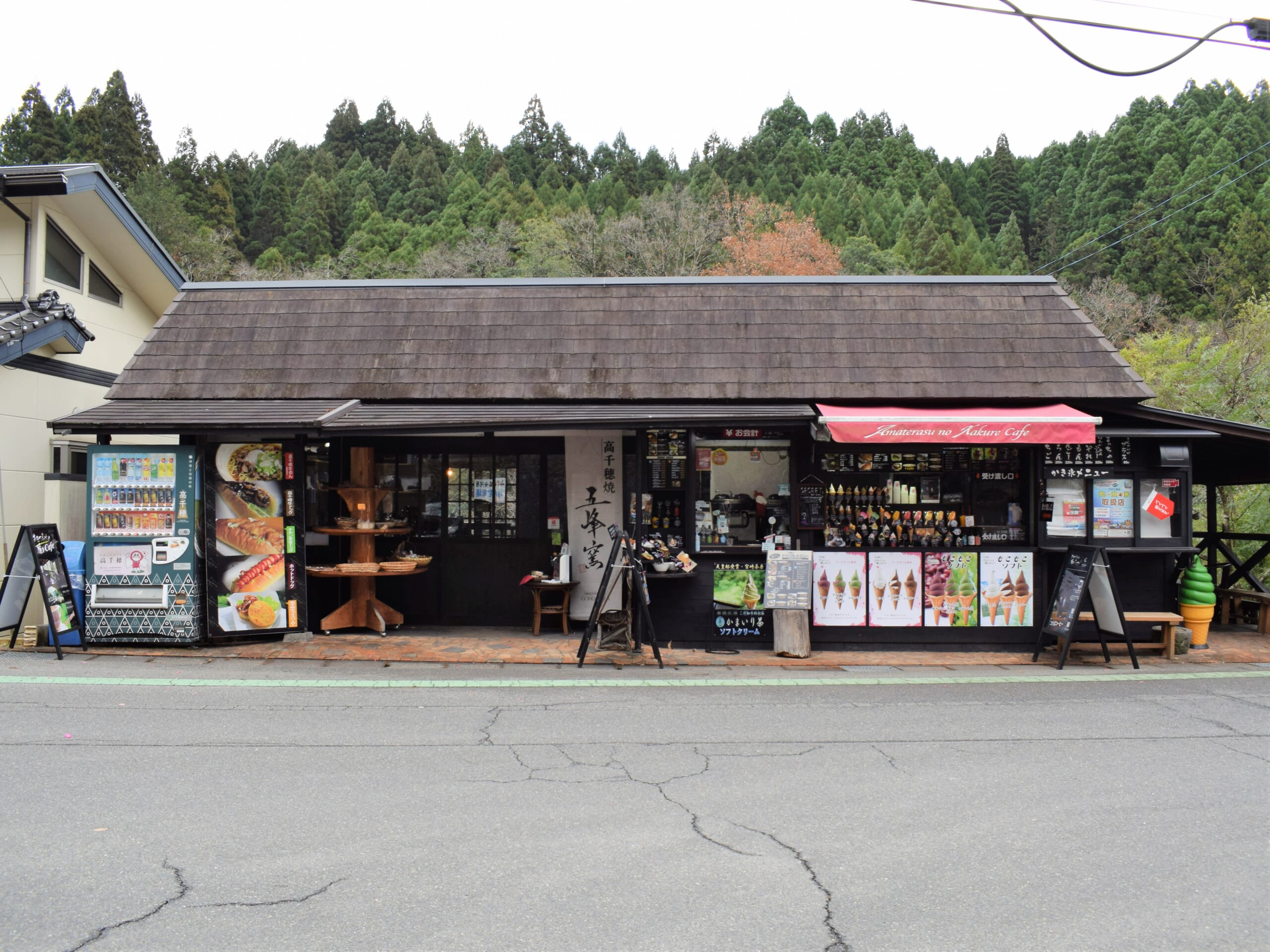
There are several cafés and souvenir shops on the way to Ama-no-Yasukawara.
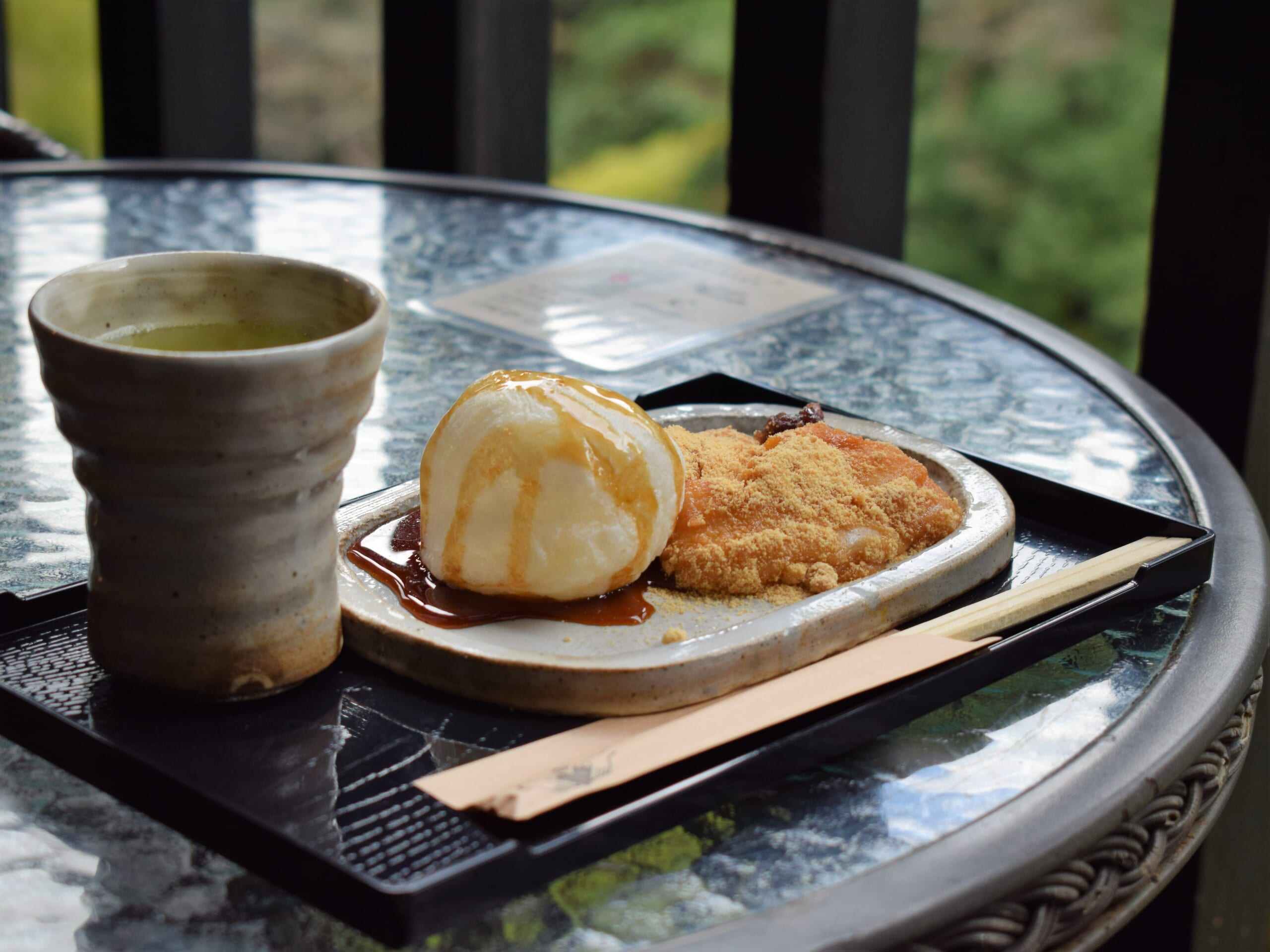
We recommend the Amaterasu-no-Kakure Cafe. Why not taking a break bathing in negative ions, in one of the terrace seats facing the Iwato River?
The café offers sweets or light meals like soft-serve ice cream and hot dogs, as well as coffee made with an original blend you can only get there. The “Kinako Mochi Set,” which consists of mochi dusted with a sweet and nutty soybean powder, used to be limited to the winter, but was so popular that it was made available all year-round.

The only shrine office at Ama-no-Iwato Shrine is located in the Inner Shrine of the West Main Shrine.
There, you can purchase the good luck charms called “omamori”, as well as the shrine seal called “goshuin” for the Ama-no-Iwato and Ama-no-Yasukawara Shrines.
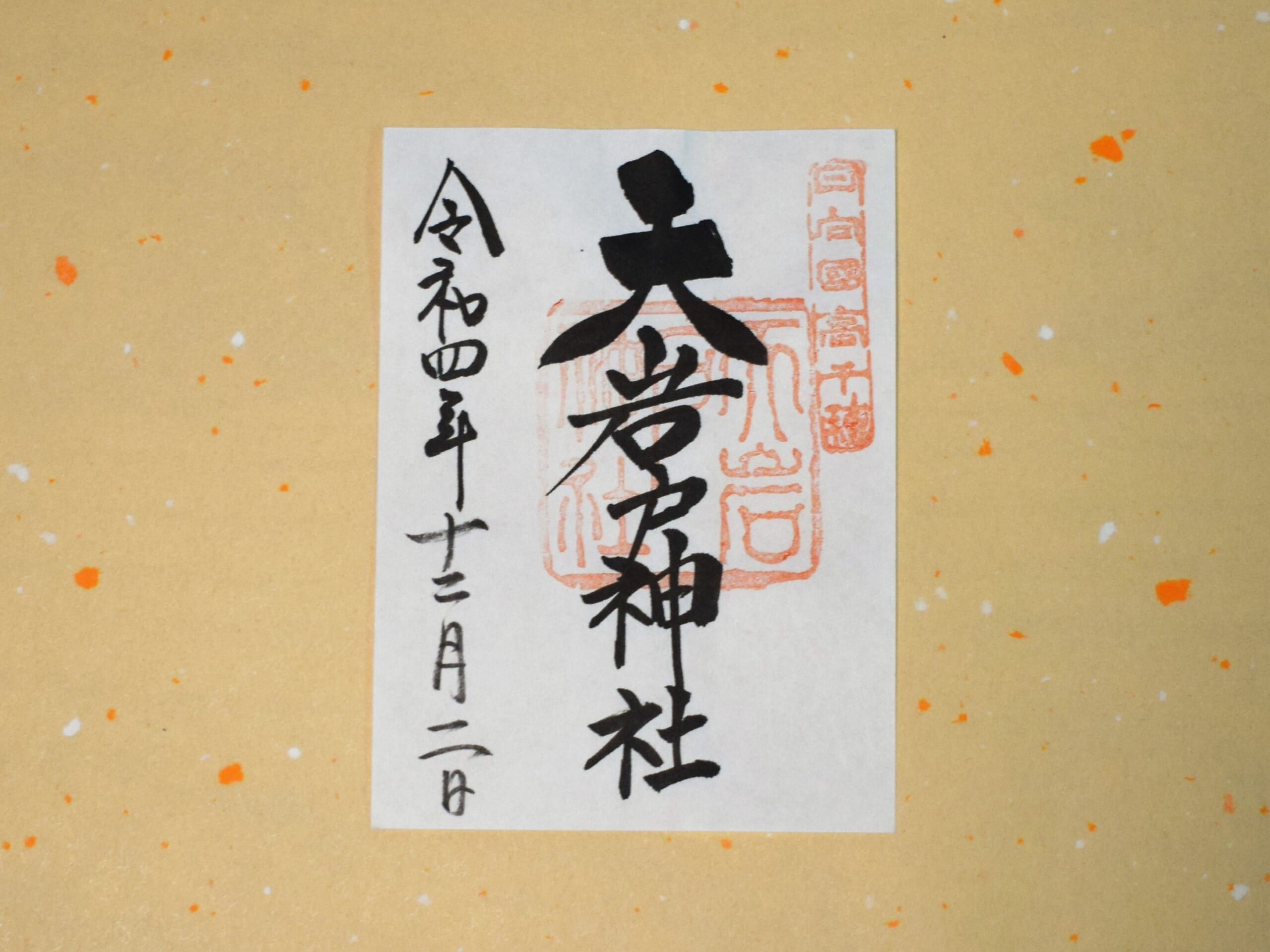
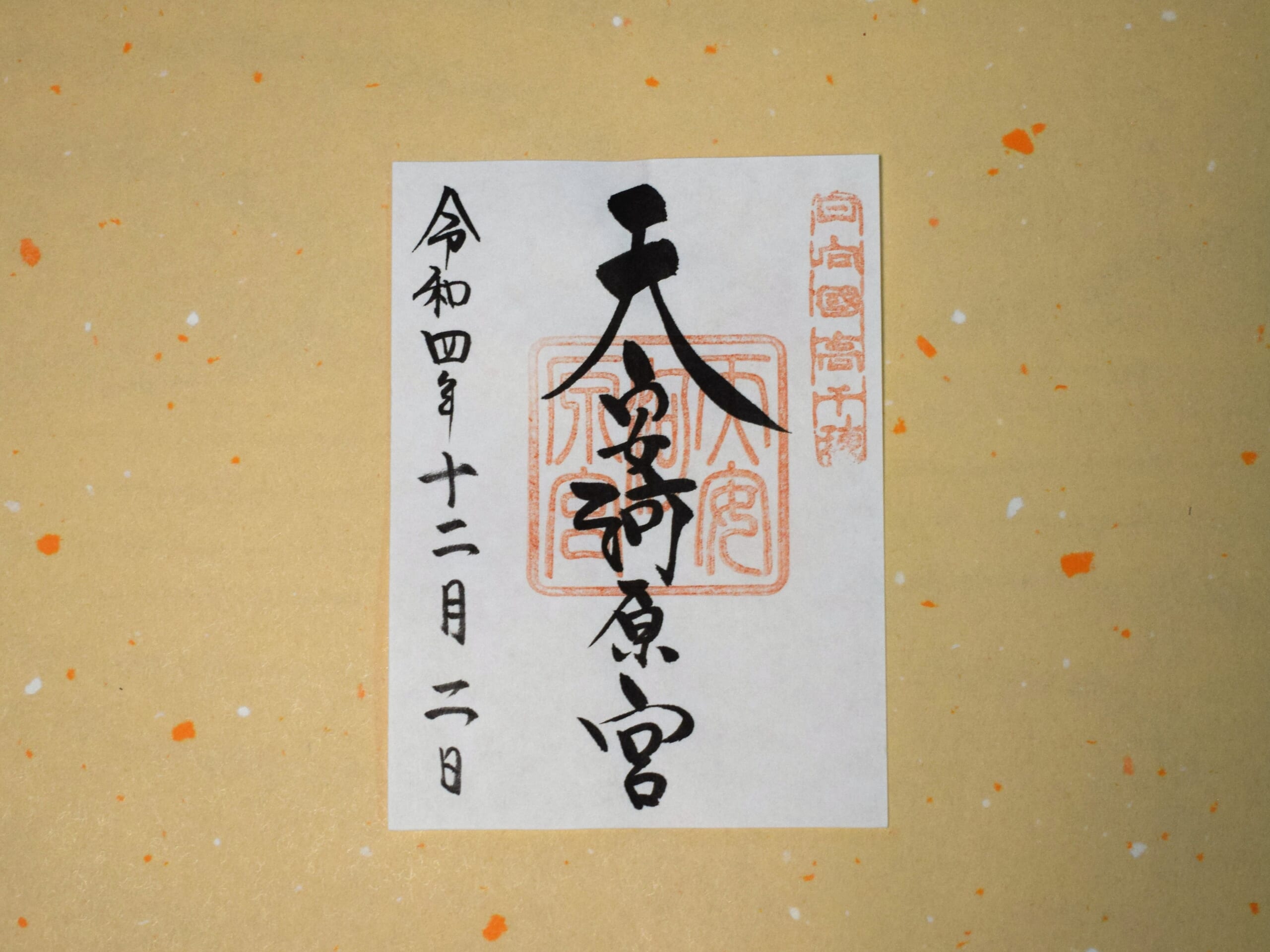
Conclusion
That was our recommended walking course around Ama-no-Iwato Cave. What do you think?
We recommend you wear comfortable shoes if you wish to follow this guide, as you will be walking on stone steps and riverside walkways that can get quite slippery. Take a leisurely stroll through this mythical site and take in the energy of this sacred place.
 関連の記事
関連の記事
 コンシェルジュからのおすすめ
コンシェルジュからのおすすめ
お客様のご要望に沿ったおすすめの観光情報・宿(ホテル 旅館)・レストラン・居酒屋・カフェ・ショップ等をコンシェルジュスタッフが厳選してご紹介しております。






